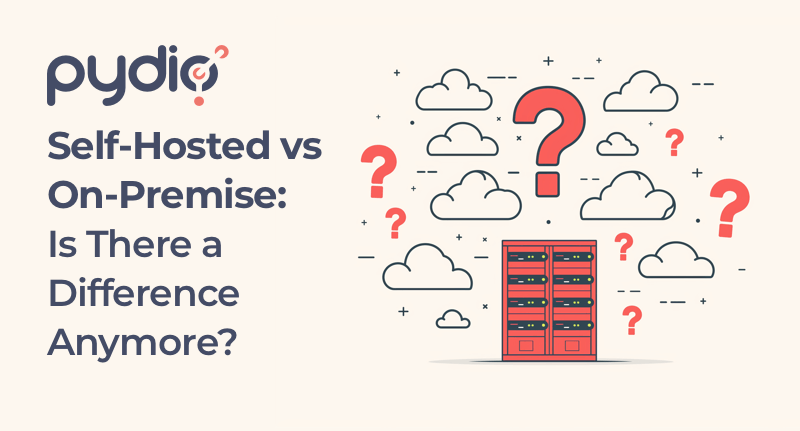Self-Hosted vs. On-Premise — Is There a Difference Anymore?

TL;DR
While there was once a clear distinction between self-hosted and on-premise hosting, the evolution of cloud computing has blurred the lines between these two concepts. Today, the terms "on-premise" and “self-hosted” mean the same thing.
Why the Confusion?
You’ve heard the term ”on-prem” or “on-premise software” over and over again, and maybe you’ve asked yourself, “Do they really mean on-premise when our infrastructure is all in the cloud?” The answer is that, in most cases, nowadays, on-premise is just the industry term that’s used to differentiate software you license and maintain yourself from software as a service offerings (SaaS). The industry is slowly moving towards the term “self-hosted” as a more accurate descriptor. But, for now, in 99% of cases, you can be confident that the terms are interchangeable.
Self-Hosted vs. On-Premise — A Brief History
Let’s look at the historical distinction between self-hosted and on-premise hosting, and how the meaning of these terms has evolved to encompass a wider range of hosting options, including hybrid and private cloud hosting.
Historically, "self-hosted" referred to the practice of hosting applications and services on hardware owned and maintained by the organization itself. This meant that the organization was responsible for purchasing, installing, and maintaining the physical servers and networking equipment required to run their applications. On the other hand, "on-premise" hosting referred specifically to hosting services and applications within the physical confines of the organization's premises, typically in a dedicated data center. That may not seem like an important difference today, but 20 or even 10 years ago, before the widespread adoption of cloud technologies, it was crucial.
The Growth of Cloud Computing
As cloud computing has gained popularity, the distinction between self-hosted and on-premise hosting has become less clear. The rise of virtualization technologies and cloud service providers means that organizations now have the option to host their applications and services in a variety of environments, ranging from traditional on-premise data centers to public, private, and hybrid cloud environments.
Today, the term "on-premise" is often used to refer to any hosting environment where the organization has full control over the underlying infrastructure, regardless of whether it is physically located on the organization's premises. This can include traditional self-hosted environments, where the organization owns and maintains the hardware, as well as private cloud environments, where the organization leases hardware from a third-party provider but retains full control over its configuration and management.
Making the Transition from On-Premise to Self-Hosted
You’ll probably still be hearing the term "on-premise" going forward because it’s sometimes being used to describe hybrid cloud environments or what is usually called “self-hosted,” where organizations use a combination of on-premise and cloud-based resources to host their applications and services rather than purchasing the software in a SaaS model. In a hybrid cloud environment, organizations can leverage the scalability and flexibility of the cloud while still maintaining control over sensitive data and applications that need to remain on-premise for compliance or security reasons.
Pydio Cells and On-Premise vs. Self-Hosted
In the case of Pydio Cells, our document sharing, collaboration and management platform, we typically refer to ourselves as self-hosted because it more accurately fits us. But if you are looking for an on-premise document sharing, collaboration and management platform that’s us too!
Need to Balance Ease-of-Use with Security? Pydio Cells Can Help.
If your organization is serious about secure document sharing and collaboration you need to check out Pydio Cells. Cells was developed specifically to help enterprises balance the need to collaborate effectively with the need to keep data secure.
With robust admin controls, advanced automation capabilities, and a seamless, intuitive end-user experience Pydio is the right choice for organizations looking to balance performance and security without compromising on either. Try Cells live for yourself. Or click on the button below to talk to a Pydio document sharing specialist.